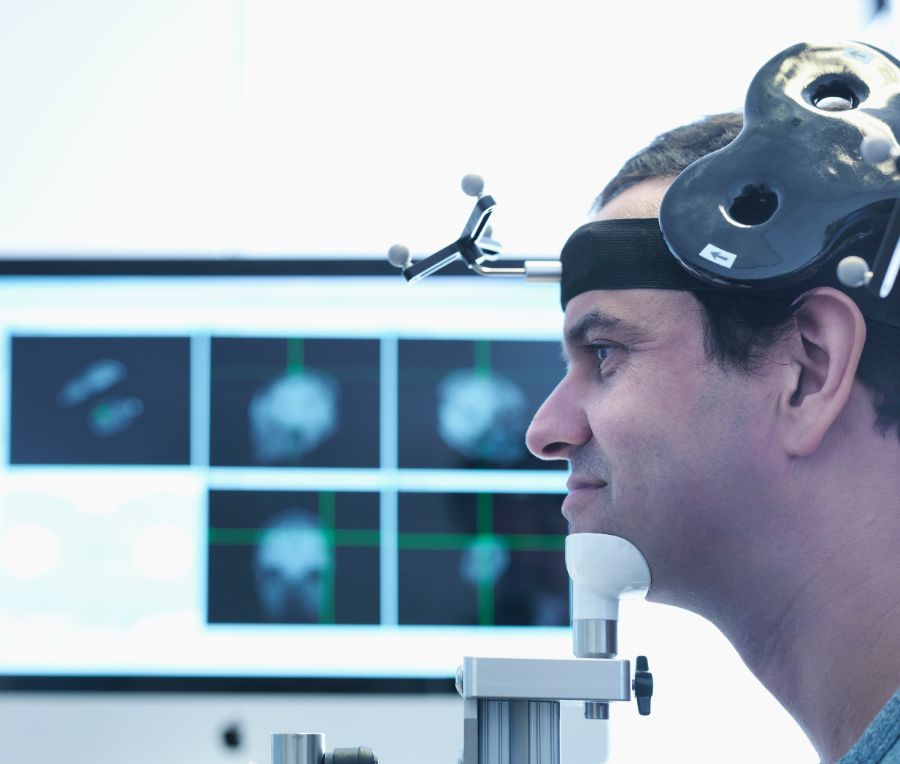
Every individual's journey to mental well-being is unique. While our core focus at Agentic Mental Health is on psychotherapy and medication management, we understand that sometimes additional support may be beneficial.
To provide the most effective care, we offer referrals to specialized providers who can offer additional treatment options. Our goal is to work closely with you to determine if these alternative approaches could complement your existing treatment plan.
TMS is a brain stimulation therapy that uses magnetic fields to target specific areas of the brain to improve symptoms of various mental health conditions. The FDA has approved it for treating the following conditions.
During the procedure, a coil is placed against the patient’s scalp. The coil sends magnetic pulses to specific brain regions to help regulate abnormal brain activity.
The neurons in the brain use tiny electrical signals to communicate information. TMS uses electromagnetic pulses to stimulate these neurons, influencing the brain's electrical activity. It primarily targets brain areas involved in emotions, decision-making, and pleasure.
TMS is non-invasive and typically has mild, temporary side effects. While we do not offer TMS therapy in-house at Agentic Mental Health, our team can refer you to trusted providers who specialize in this form of treatment.
Transcranial Direct Current Stimulation (tDCS) is a type of non-invasive brain stimulation. It delivers a low but constant electric current to the brain through electrodes placed on the scalp. tDCS can help enhance cognitive and motor skills by modulating neural activities in the brain.
During a tDCS session, a low-level electrical current flows between the electrodes, passing through the brain to complete the circuit. This can help alter the resting membrane potential of neurons, which can either increase or decrease neuronal excitability.
tDCS can help improve cognitive functions, promoting mental clarity, focus, and memory. It can be a valuable treatment option for various mental health conditions, including depression, ADHD, and anxiety. If considered appropriate for you, our team can provide you with referrals to specialists who offer tDCS therapy.
Controlled doses of ketamine, a dissociative anesthetic medication, can be used to improve symptoms of various mental health conditions.
Ketamine is a medication developed in the 1960s and approved by the FDA for use in surgical anesthesia.
In recent years, ketamine has shown positive results in managing mental health disorders. It is now considered a safe and effective off-label treatment of various treatment-resistant mental health conditions, including:
Ketamine works by blocking NMDA (N-methyl-d-aspartate) receptors in the brain. These receptors are specifically designed to respond to glutamate, the brain's most abundant excitatory neurotransmitter. This surge in glutamate triggers various reactions that enable the brain to form new neural connections.
Essentially, ketamine resets the brain, paving the way for healthier thought patterns. This ability of ketamine to create new neural pathways can have a positive impact on mental health conditions.
If our team determines that ketamine-assisted therapy could be beneficial for you alongside other treatments, we can provide referrals to experts who specialize in this area.
Esketamine is a more potent form of ketamine that has gained attention in recent years for treating depression when other treatments prove to be ineffective. The FDA has recently approved esketamine for use as a nasal spray specifically to address treatment-resistant depression.
Due to its high potency, esketamine can provide rapid relief from depression symptoms at lower doses.
Esketamine can distort perception in the first few hours after treatment and needs supervision to ensure safety. Therefore, it is administered under medical supervision in a clinical setting. Our team can connect you with specialists who provide esketamine treatment as needed.
Quantitative EEG, also known as brain mapping, is a diagnostic tool that measures your brain’s electrical activity through brain wave patterns.
When neurons communicate within the brain, rhythmic electrical impulses or brain waves are generated. These waves can provide important insights into your overall brain function and can reveal information about your stress levels, thought patterns, and emotions.
A qEEG can detect specific brainwave patterns associated with brain impulsivity, cognitive inflexibility, anxiety, and other symptoms. qEEG can be used as a valuable diagnostic tool to identify various mental health disorders.
We utilize qEEG as a diagnostic tool to inform our treatment plans. While we do not provide qEEG services in-house, we collaborate with trusted providers who specialize in this area and can provide referrals.
Neuropsychological testing involves a series of assessments designed to evaluate the functioning of your brain. The tests measure various cognitive abilities, such as memory, attention, problem-solving, language skills, reasoning, and more.
This comprehensive evaluation can help identify strengths and weaknesses in brain function. It also helps assess how these factors may impact your behavior and cognition.
Neuropsychological testing is essential for identifying the cognitive effects of brain damage and severe mental illness. While it does not directly diagnose a condition, it provides valuable insights that aid in the diagnosis and management of various mental health conditions.
This testing can provide detailed information about your cognitive abilities and help guide treatment plans for conditions like, brain injuries, learning disorders, ADD, and ADHD.
At Agentic Mental Health, we do not perform neuropsychological testing directly but can refer patients to trusted specialists who offer this service.
At Agentic Mental Health, our skilled team is here to support your mental health and help you regain control over your life and happiness. We provide personalized mental health treatment services to address your specific conditions.
To book a consultation, call us at 434-284-5980 or schedule an appointment online.
Monday-Friday
8am - 6pm
We're committed to providing the best possible care for our current patients. This means we're temporarily unable to accept new patients.
To join our waitlist, please fill out the form below and we'll reach out as soon as a spot becomes available. We value your well-being and want to connect you with the right support when we can.